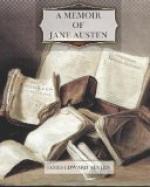makes it easy to know how to treat myself. You
will be glad to hear thus much of me, I am sure.
We have just had a few days’ visit from
Edward, who brought us a good account of his father,
and the very circumstance of his coming at all, of
his father’s being able to spare him, is
itself a good account. He grows still, and
still improves in appearance, at least in the estimation
of his aunts, who love him better and better, as
they see the sweet temper and warm affections of
the boy confirmed in the young man: I tried
hard to persuade him that he must have some message
for William, {169a} but in vain. . . . This
is not a time of year for donkey-carriages, and
our donkeys are necessarily having so long a run of
luxurious idleness that I suppose we shall find they
have forgotten much of their education when we
use them again. We do not use two at once
however; don’t imagine such excesses. . .
Our own new clergyman {169b} is expected here
very soon, perhaps in time to assist Mr. Papillon
on Sunday. I shall be very glad when the first
hearing is over. It will be a nervous hour
for our pew, though we hear that he acquits himself
with as much ease and collectedness, as if he had been
used to it all his life. We have no chance
we know of seeing you between Streatham and Winchester:
you go the other road and are engaged to two or
three houses; if there should be any change, however,
you know how welcome you would be. . . . We have
been reading the “Poet’s Pilgrimage
to Waterloo,” and generally with much approbation.
Nothing will please all the world, you know; but parts
of it suit me better than much that he has written
before. The opening—
the proem
I believe he calls it—is very beautiful.
Poor man! one cannot but grieve for the loss of
the son so fondly described. Has he at all
recovered it? What do Mr. and Mrs. Hill know
about his present state?
’Yours affly,
’J. AUSTEN.
’The real object of this letter
is to ask you for a receipt, but I thought it genteel
not to let it appear early. We remember some
excellent orange wine at Manydown, made from Seville
oranges, entirely or chiefly. I should be
very much obliged to you for the receipt, if you
can command it within a few weeks.’
On the day before, January 23rd, she had written to
her niece in the same hopeful tone: ’I
feel myself getting stronger than I was, and can so
perfectly walk to Alton, or back again
without fatigue, that I hope to be able to do both
when summer comes.’
Alas! summer came to her only on her deathbed.
March 17th is the last date to be found in the manuscript
on which she was engaged; and as the watch of the
drowned man indicates the time of his death, so does
this final date seem to fix the period when her mind
could no longer pursue its accustomed course.
And here I cannot do better than quote the words of
the niece to whose private records of her aunt’s
life and character I have been so often indebted:—




